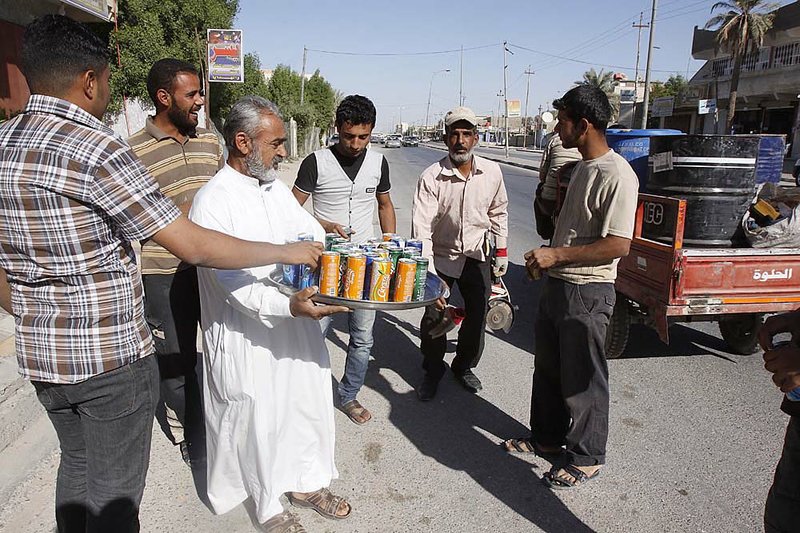BAGHDAD — For the first time in decades, Iraqis face a future on their own, with neither Saddam Hussein’s iron fist nor the United States’ military might to hold them together.
Now many fear an increase in violence, growing Iranian influence and political turmoil after President Barack Obama’s definitive announcement that all U.S. forces will leave by the end of the year.
READ MORE
http://www.arkansas…">The Iraq war
Iraqis across the political, religious and geographic spectrum Saturday questioned what more than eight years of war and tens of thousands of Iraqi and U.S. lives lost had wrought on their country and how their still-struggling democracy could face the challenges ahead.
“Neither the Iraqis nor the Americans have won here,” said Adnan Omar, a Sunni from the northern Iraqi city of Kirkuk.
Rifaat Khazim, a Shiite from the southern city of Basra, said, “I do not think that this withdrawal will bring anything better to Iraq or that Iraqi leaders will be able to achieve stability and security in this country. Most of the Iraqis yearn now for Saddam’s time. Now, Iraq is defenseless in the face of the threats by the neighboring countries.”
Many said they think the powerful American presence prevents Iraqi politicians from dragging the country into the worst of sectarian reprisals and hatreds. Few believe Iraqi forces are up to keeping security or can avoid falling into the same sectarian splits.
“After the American withdrawal, the security in Iraq will definitely deteriorate. More attacks by al-Qaida are likely to happen,” said Dhia Abdullah, a Shiite from eastern Baghdad. “The security elements are not loyal to Iraq but to parties and militias; therefore, the security situation will be very bad after the withdrawal.”
Nearly 40,000 U.S. troops remain in Iraq, all of whom will withdraw by Dec. 31, a deadline set in a 2008 security agreement between Baghdad and the administration of then-President George W. Bush.
The Obama administration, concerned over continued violence and growing Iranian influence, for much of this year pushed to keep thousands of U.S. troops there in a significant-sized training mission. Prime Minister Nouri al-Maliki and other Iraqi officials expressed support of the idea, and they negotiated for months.
But talks ran aground over Iraqi opposition to giving American troops legal immunity that would shield them from Iraqi prosecution. Legal protection for U.S. troops has always angered everyday Iraqis who saw it as simply a way for the Americans to run roughshod over the country. Many Iraqi lawmakers were hesitant to grant immunity for fear of a backlash from constituents.
“When the Americans asked for immunity, the Iraqi side answered that it was not possible,” al-Maliki said at a news conference Saturday. “The discussions over the number of trainers and the place of training stopped. Now that the issue of immunity was decided and that no immunity to be given, the withdrawal has started.”
Many Iraqis, both Sunnis and Shiites, were sure the departure of American forces inevitably will lead to a rise in Iranian influence.
“The withdrawal announcement is a message to the Iranians to come and take over Iraq. The Iraqis are the real losers here because they have replaced the U.S. occupation with Iranian occupation,” said Adel al-Dulaimi, a Sunni from northern Baghdad.
In an interview released Saturday, Iranian President Mahmoud Ahmadinejad said that Tehran has “a very good relationship” with Iraq’s government that will continue to grow.
“We have deepened our ties day by day,” Ahmadinejad said in an interview Saturday with CNN.
Many Iraqis were happy, having resented years of pulling to the side of the road when American troops drove by or putting up with raids of their homes in the middle of the night.
“The Iraqi people are the winner because a few months from now, we will walk in the streets without seeing U.S. troops and this is a source of joy to us because Iraq has restored its full sovereignty,” said Saif Qassim, a Sunni from the northern city of Mosul.
Others suspicious of the U.S. questioned whether the American military would ever give up its toehold.
“I believe that the full withdrawal will be only in the media but there must be secret deals with the Americans to keep some American forces or members of the American intelligence,” said Raja Haidr, a Shiite from eastern Baghdad. “They won’t leave.”
Al-Maliki told reporters that he still wants American help in training Iraqi forces to use billions of dollars worth of military equipment that Baghdad is buying from the United States. About 160 U.S. troops will remain at the U.S. Embassy in Baghdad to help oversee training plans — a duty that is common at most American diplomatic posts worldwide.
U.S. officials, from Obama to Defense Secretary Leon Panetta and Secretary of State Hillary Rodham Clinton, stressed that Washington will continue to have a strong diplomatic relationship with Baghdad.
Front Section, Pages 9 on 10/23/2011
